- Home
- Barbara Ehrenreich
Living With a Wild God Page 4
Living With a Wild God Read online
Page 4
So I would get to the answers by thinking—not by dreaming or imagining and of course not by praying or pleading to imaginary others. “The situation” would yield to sheer force of mind. As I wrote to myself, I had decided on “an orderly plan of attack, systematic, geometrical.” If A, then B, and so forth. I was so confident that this method would work that when I raised the question of how we “can live happily knowing or thinking that our existence as individuals is so brief and futile,” I could go on to promise in the same journal entry that “I shall try and write the answer to that question when my present ideas are straightened out.”
The first problem was to identify the minimum of bare, incontestable facts that any philosophical inquiry has to begin with, and this brought me up immediately against the problem of the reliability of other people. Did they have anything useful to say, anything that could be built upon? All in all, school was not proving to be a reliable source of information. There was, for example, the science teacher who drew his biology lessons from the book of Genesis and exhibited a sneering contempt for anyone who imagined that rocks had been around for more than six thousand years. I entertained myself in his class by concentrating on developing an empathic relationship with the trash can that sat between his desk and my seat. It was gray and squat and humble, not a cylinder but a slice of a cone, hinting at the existence of an invisible person or people whose job was to empty it every night. Just as I could intuit the subjective state of every person I encountered, there was nothing to stop me from imagining that, in their own way, even objects were alive. What did it feel like, assuming that a trash can could feel, to be a receptacle for every bit of garbage that came your way? Did it choke on each piece of refuse that came flying into it, or did it take an austere pride in its silent self-abnegation?
Or I might mention the eighth-grade English teacher who kept me after class to accuse me of plagiarizing my paper on The Iliad, since it was obviously something I could not have written myself. Perhaps in an attempt to make me feel the wrath of Achilles pounding in my temples, right then and there, she announced that my grade for the paper would be F. Also in the eighth grade, Mr. Cummings, the kindly martinet who served as principal—or as he liked to put it, headmaster—of Moody Junior High School in Lowell, intercepted me in the corridor one day to inform me gravely that my IQ, so stellar a year ago, had taken a sudden dive. This was not surprising to me, given the other mutilations being inflicted by puberty. If my body was going to get all leaky and mossy, why not my mind? Although it occurred to me after a few days of reflection that the real sign of mental deterioration was that I had allowed myself to be dismayed even briefly by the news, because it was not my intelligence but the very idea of “IQ” that had been discredited by the latest test result.
Math, which had been a source of consolation when the subject was geometry or algebra, offered a fresh reason for wariness when the topic turned to imaginary numbers. Imaginary numbers? How could anyone introduce the concept with a straight face? Would a history teacher who’d been lecturing about generals and kings suddenly announce that the next topic would be pixies and elves? As it happened, I already knew about these odd creatures, probably from the science writer Isaac Asimov, and knew that they were an affront to human reason. Think about it: Imaginary numbers are defined as multiples of the square root of −1, but there can be no number corresponding to the “square root of −1,” because if you multiply −1 by −1, you get, of course, +1, which is why Descartes in the seventeenth century had derided them as “imaginary” and refused to accept their existence. And who could be more respectable than Descartes, the discoverer, or so it seemed, of the “Cartesian plane”—that infinite flatland on which abstract equations took physical form as lines and curves, soaring and diving across the paper like living creatures?
But for my teacher, a dowdy white-haired woman whose tired eyes suggested she went home by bus to an even more elderly mother, it was just another day at the blackboard, without the slightest threat of paradox. So I raised my hand, more or less as a public service, and pointed out the absurdity of “the square root of −1,” at least relative to everything we had learned so far in math. She blinked, I’ll say that, but just barely—acknowledging that it was an interesting point and moving right along. At least I had tried to warn my classmates, not that any of them appeared to be listening. If you accept imaginary numbers without raising a question, you’ll swallow any goddamn thing they decide to stuff down your throat.
I wanted to believe, and perhaps had believed when I was younger, that my parents were trustworthy sources. They both read copiously, after all, and liked to argue, discuss, and point out the multiple failings of the people outside our family, a dangerously high proportion of whom they classified as zombies, cult members, or morons coasting along on their sinecures. There were the young nuns, for example, novitiates actually, whom I walked past every morning on my way to school—girls not much older than myself wearing long gray habits, eyes downcast as they marched up the hill in chain gang formation, to what dark ritual I do not know. If there hadn’t been so many of them, and if they hadn’t been followed by two huge mothlike grown-up nuns, I might have attempted a conversation or at least a nod, but I never even succeeded in making eye contact. I just walked on by, thanking God or fate or whatever spirits arrange these things, for giving me the parents I had, who, whatever their faults, which were legion, would never think of offering a child up to God.
But could they be trusted, these rationalist, atheist parents of mine? You might think my father would have been a touchstone of truthfulness, with his insistence on logic, on always probing further with the question why, but on small matters he was a habitual liar, as we were reminded almost every day. My mother put great effort into the production of dinner, which typically featured meat, gravy, potatoes, and a home-baked dessert, like the butterscotch cream pie my father craved—everything cooked soft because his teeth were so bad. The food would be getting cold on the plates when he’d call to say he’d been caught up in a meeting, or maybe he didn’t call at all, and we kids ate alone while our mother fumed and lit one cigarette after another. We all knew the “meetings” took place in bars or possibly motel rooms, because he came back, if he came back early enough for me to still be awake, in a loose-lipped, goofy frame of mind, smelling of liquor. I don’t think he would lie about something like the specific gravity of mercury or the boiling point of water, unless, of course, it was the only way to win an argument against someone who was equally tipsy.
As for my mother, I had once trusted her enough to try to enlist her help with my quest, because she was after all a major source of information, an insatiable consumer of novels and magazines with no other regular confidante than myself. For months I had been observing adult behavior, meaning mostly my parents’, and decided it could be sorted into two categories. There were the things that they did primarily to promote their own survival, like eating, and there were the things they did for the sake of biological reproduction, a category that included putting on makeup and cooking for their children. If they were doing anything else with their time—like writing poetry or attempting to contact extraterrestrial beings—it was not in evidence to me. Just carry on those germ cells and populate the earth; that seemed to be the entire agenda.
I saw this as a remarkable simplification, almost a theoretical breakthrough. When I approached her with it, my mother was washing her nylons in the bathroom sink, which I recognized as another reproductive-type duty. Could this be all there is, I asked her—just trying to prolong our own lives while reproducing the species? And what was the point?
There are a lot of things she could have said then, if she’d had the confidence, if she’d straightened up from the sink and taken a deep breath, because certainly she’d read enough to know what the liberal, secular answers might be. She could have said, no, we are not just your run-of-the-mill terrestrial animals. You don’t have to be religious to see that we also live for love o
r, I don’t know, some other sentimental abstraction like beauty or justice or truth. But she didn’t even try to answer, just glared at me with that familiar combination of resentment and disgust, and then asked why I had nothing to do. It was many years before I realized that the question had been a grave personal insult, an attack on what she must have felt was the triviality of her own existence.
By the time we lived in Lowell she didn’t hit me so much anymore, for the simple reason that I was getting to be taller than she was—in other words, more of a reach. This had to have been a challenging adjustment for her, just as my brother’s growing strength would pose a problem for my father in a couple of years. Too bad for any parent who has become accustomed to ruling by force, because at some point the kids just get too big to slap around. Then new and subtler weapons have to be brought into play, such as insults and invasions of privacy, like the time I came home from school to find my drawers emptied onto the bedroom floor because she had peeked into them and found them unacceptably messy. I could have cried, and probably did just a little, although I knew this would make my eyes sting through the hours of homework and reading ahead. I picked my clothes up off the floor and put them away, but to this day I’ve never understood why the clothes you’re not wearing have to be hidden, and why, if you’re going to go to the trouble of hiding them, you have to first fold them in some precisely specified way.
But my mother’s worst, to this day most unforgivable crime was to accuse me of harboring incestuous designs on my father. I don’t remember what brought this on, if I even knew at the time. She didn’t use the word “incest,” which I probably wouldn’t have known anyway, nor of course did she offer any kind of evidence. She just announced as a scientific fact—“Freud said”—that girls are “sexually attracted” to their fathers, which is obviously why I favored my father over her. I managed to keep my face aligned in a disciplined expression of scorn and indifference, even as I crumpled inside. So every glorious moment in which I had said something that made my father laugh or at least snicker, every instance in which he’d taken the time to explain some natural phenomenon to me—all these were now revealed as evidence of a hideous perversity.
I didn’t write about this accusation in my journal, which was reserved for loftier matters; I didn’t even have a category under which to file it in my brain. Sexual desire for a man—or for anyone or anything? Sex was something that occasionally happened to women in novels, generally leading to poverty or death. I had read about sexual desire in psychology books from the library, where it was sternly represented as a “drive,” which seemed to involve being propelled by whips, and I occasionally received mysterious bulletins from unexplored parts of my body. My mother had warned me often enough about this drive, which is what she blamed for—or credited with—her transformation from a teenager into a housewife, and no doubt the same thing had undone my cousin Patsy Jane, one of my childhood companions in Butte, who was only two years older than me and already a mother. Apparently there was no honorable way out, because if you frustrate the sex urge, all you get is depravity, as my mother illustrated with the story she had read somewhere about a nun who repeatedly stuck a pencil into her vagina in order to warrant medical attention to the afflicted area.
As for the sex act itself—and recall that at this time sex was still an “act” known as intercourse—I had recently received some disturbing information from my best friend in Lowell, Bernice, who had a cousin who claimed to have observed her parents performing it. Bernice was Greek Orthodox, so we spent a great deal of time arguing about religion, but we generally faced the indignities of adolescence, like “monthlies” and the pressure to “develop,” as a united front. We were walking to school when she asked me if I wanted to know what her cousin had seen, and with some trepidation I told her I did. The words didn’t come easily to her because they weren’t the kind of words we ever had occasion to use. I kept on walking, trying to be cool about it, but she might as well have told me that the participants sprout horns out of their belly buttons and proceed to gore each other. It was beyond ludicrous. I said something intemperate involving “Jesus,” or maybe all the way to “Jesus Christ,” leading her to scold me for taking the Lord’s name in vain. But she knew as well as I did that the real horror lay elsewhere, in what she had just said. If this was what adults dressed up and put on makeup for, flirted and schemed for, even saw as a defining activity of their lives, then why had they been put in charge?
Somewhere around this time I stopped listening to my mother if I could avoid it, even in her gabby, confiding moods when she went on about books she was reading or the stupidity of the people she’d been forced to socialize with the night before. I noted in my journal that “she thinks I am cold and withdrawn,” which was exactly the effect I was striving for. She went on, on more than one occasion, to warn me that my “coldness” would make me permanently unattractive to men, meaning that I was, generally speaking, unworthy of love. But still I didn’t hate her, even for the accusation of illicit Freudian yearnings, because I understood that no one could have lobbed such a stinging wad of shame out into the world without having a considerable personal reserve of it to draw on.
I’d still like to know what she had against me. Was I a scapegoat for my father? Or possibly for my aunt Jean? Or was I some voodoo amalgam of both of them—people who were more self-confident than she was, quicker and funnier? The problem with families is not that you get stuck in the same persona for life, which is what everyone complains about, but that you’re always getting confused with someone else and end up taking the blame for them. You may think of yourself as a freestanding individual, a unique point of consciousness in the universe, but in many ways you are just subbing for absent family members or departed ancestors. You may even literally change places with them, like the night that first year in Lowell when I heard my mother calling for me from her bedroom, where I found her lying on the floor drunk, wearing only her panties and whimpering that she couldn’t get up. My father was asleep or passed out, so I had to turn into the mother—or at least the motherlike figure in this sordid drama—and haul her to the toilet like a big floppy baby.
Or possibly she didn’t dislike me in particular at all and had just absorbed the Freudian propaganda, so readily available in the middlebrow culture then, that little children are all hell-bent on fucking their parents. She had informed me once that my father had an unwholesome attachment to his own mother, and that this somehow explained his shortcomings as a husband, his failure to form a mature and responsible bond. In her version of Freudianism, the human world was fraught with illicit intergenerational longings—between her daughter and her husband, her husband and his mother—all of them bypassing her.
Contrary to her lurid imaginings, puberty had also driven a wedge between my father and me. Up till that point he might have imagined me as some sort of successor to him—a scientist of course, since that’s what “smart” people did—though I was not as smart as he was, nor could anyone hope to be, given that he claimed an IQ of 187, which put the rest of us at the level of insects by comparison. Still, he had always allowed that I was perhaps just capable of growing up to make a scientific discovery that would lead to some modest improvement in human life, a cure for acne being his usual example of a breakthrough that I might aspire to. But now that I was fourteen, it was getting hard to deny that I was on course to turn into a woman, and a woman couldn’t be a scientist without being some sort of chimera, part male and part female and wholly ridiculous. He got warier around me, not sure whether to praise me for a new outfit or growl at me for getting less than 100 on a math test. There was no way to be both a girl, at least a girl in any normal sense, and a junior version of Dad. Even modest success in one department inevitably meant failure in the other, and failure led regularly to mockery, as in, “Oh, Barb thinks she can cook too?” It was damned if you do and damned if you don’t, and best to stay out of the way.
If you can’t trust your parents a
nd they are intelligent, apparently rational, and au courant, then you can’t trust much of anything, and that goes for science as well. Electrons, planets, genes—all these were made suspect, at some deep ontological level, by my parents’ endorsement of them. Had I ever seen an electron or even made a careful study of the reasons to think their existence is plausible? Had I gone through the steps to convince myself that a certain point of light in the sky is a planet as opposed to some other bit of space debris? No, of course not. I was completely dependent on scientists for my information about these hypothetical entities, which meant I was assuming that scientists were telling the truth about their observations and inferences and that they were not malign tricksters bent on propagating a massive fiction, nor, for that matter, were they cleverly designed androids in the service of some master trickster. And if I was going to be absolutely rigorous, no assumptions could be permitted at all.
The impetus to set down my first statement of the “facts” was the weekend I spent at a Baptist summer camp, or “resort,” to which I had been invited by a Baptist friend. There must be thousands of religious-themed camps like this in the country, aimed at enticing the young with outdoor activities while soothing the elderly with hymns and chicken à la king. This camp featured a dock reaching tentatively out over a light blue lake, or more accurately, pond—never mind that the name of the place promised an ocean beach—and an inordinate amount of prayerful gratitude for the turning of the earth on its axis: O Lord, we thank you for this day! I did my best to fit in, bowing my head along with everyone else’s and generally zipping my lips so as not to disappoint my friend, who had expressed some shy hopes of saving my soul. Little did she realize how thoroughly her efforts would be undermined by this brief exposure to her coreligionists, as I wrote in my journal:

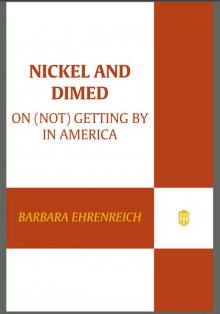 Nickel and Dimed: On (Not) Getting by in America
Nickel and Dimed: On (Not) Getting by in America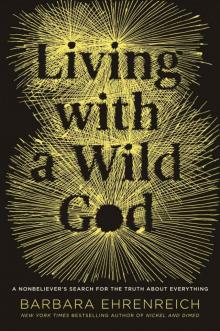 Living With a Wild God
Living With a Wild God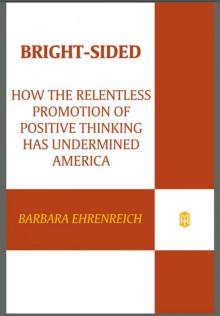 Bright-Sided
Bright-Sided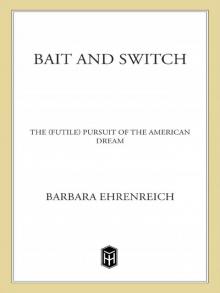 Bait and Switch: The (Futile) Pursuit of the American Dream
Bait and Switch: The (Futile) Pursuit of the American Dream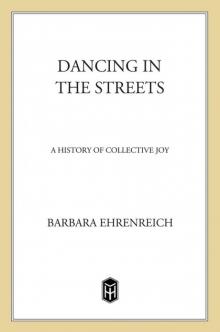 Dancing in the Streets: A History of Collective Joy
Dancing in the Streets: A History of Collective Joy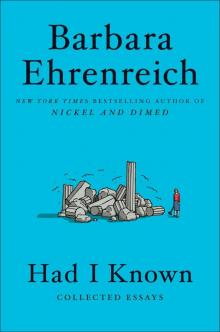 Had I Known
Had I Known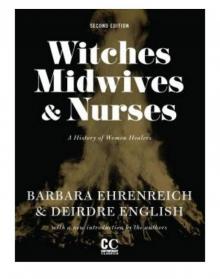 Witches, Midwives, and Nurses
Witches, Midwives, and Nurses For Her Own Good: Two Centuries of the Experts Advice to Women
For Her Own Good: Two Centuries of the Experts Advice to Women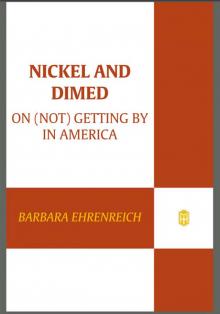 Nickel and Dimed
Nickel and Dimed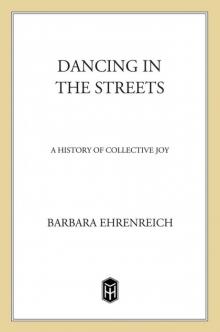 Dancing in the Streets
Dancing in the Streets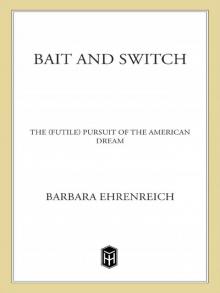 Bait and Switch
Bait and Switch